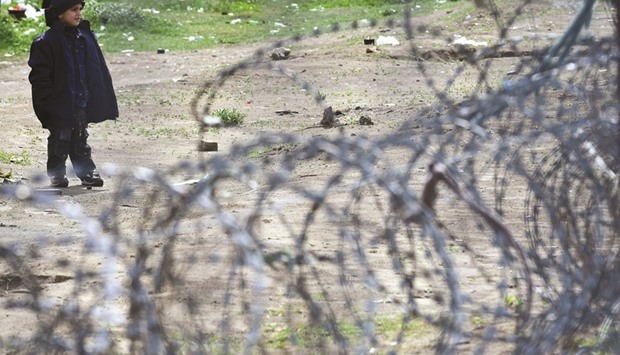Asylum-seekers should not be transferred to Hungary from other European countries because Hungary’s new detention centres run counter to international law, the UN Refugee Agency (UNHCR) said yesterday in Geneva.
The UNHCR urged countries to suspend such relocations under the European Union’s Dublin Regulation.
“The situation for asylum-seekers in Hungary, which was already of deep concern to UNHCR, has only gotten worse since the new law introducing mandatory detention for asylum-seekers came into effect,” said Filippo Grandi, the UN high commissioner for refugees.
However, a suspension would likely have no big effect, since Hungarian authorities have been very reluctant to take in migrants under the Dublin system.
The new detention policy came into effect in late March.
The measure orders asylum-seekers to be held in two camps on Hungary’s border with Serbia.
It applies to all refugees and migrants.
The so-called Dublin Regulation, which aims to stop people making asylum claims in multiple countries by requiring asylum-seekers to be sent back to the first European country they arrived in, applies to EU nations as well as non-members Switzerland and Norway.
Hungary already rejects most requests from European countries for transfers under the Dublin system, arguing that most migrants who pass through the country first came through Greece.
According to the Hungarian branch of the Helsinki Committee rights group, Hungary received 26,998 requests last year, but took back only 513 asylum-seekers under the Dublin agreement.
Grandi said that he was “encouraged” by a European Commission decision to work with Hungarian authorities in an attempt to bring Budapest’s practices in line with EU law, but stressed in a statement that “urgent measures are needed to improve access to asylum in Hungary”.
The UN refugee agency has repeatedly cautioned that Hungary’s use of physical barriers and restrictive policies basically deny the access to asylum guaranteed under international law.
Since Hungary’s new law came into force on March 28, all new asylum-seekers, including children, have been “detained in shipping containers surrounded by high razor fences at the border for the entire length of their asylum procedures”, the UNHCR said.
According to the government, 324 shipping container homes have been installed at two separate locations called “transit zones” built into a fence that Hungary erected along the 175km border in 2015.
The UNHCR warned last month that the new practice would “have a terrible physical and psychological impact on women, children and men who have already greatly suffered”.
As of last Friday, 110 people, including four unaccompanied children and children with their families, were being detained there, the UNHCR said.
EU member Hungary previously systematically detained all asylum applicants but suspended the practice in 2013 under pressure from Brussels, the UN refugee agency and the European Court of Human Rights.
Yesterday Grandi hailed efforts by Hungarian authorities to address allegations of police violence.
But he said: “We remain very concerned about highly disturbing reports of serious incidents of ill-treatment and violence against people crossing the border into Hungary, including by state agents.”
“These unacceptable practices must be brought to an end and I urge the Hungarian authorities to further investigate any allegation of abuse and violence,” he added.
Other organisations also expressed concern.
“The government deliberately dismantles the asylum rule system in Hungary, and by doing so puts refugees at risk,” Gabor Gyulai of the Hungarian Helsinki Committee told AFP. “This is not worthy of a European country and EU member.”

This file photo taken on April 6 shows a young migrant boy waiting in front of the Hungarian border fence at the Tompa border station transit zone. European countries must stop returning asylum-seekers to Hungary because of deteriorating conditions there for new arrivals including children, and allegations of abuse, the United Nations said.
